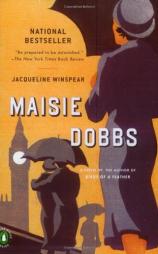Excerpt
Excerpt
Maisie Dobbs: A Novel

Spring 1929
Even if she hadn't been the last person to walk through the turnstile at Warren Street tube station, Jack Barker would have noticed the tall, slender woman in the navy blue, thigh-length jacket with a matching pleated skirt short enough to reveal a well-turned ankle. She had what his old mother would have called "bearing." A way of walking, with her shoulders back and head held high, as she pulled on her black gloves while managing to hold on to a somewhat battered black document case.
"Old money," muttered Jack to himself. "Stuck-up piece of nonsense."
Jack expected the woman to pass him by, so he stamped his feet in a vain attempt to banish the sharp needles of cold creeping up through his hobnailed boots. He fanned a half dozen copies of the Daily Express over one arm, anticipating a taxi-cab screeching to a halt and a hand reaching out with the requisite coins.
"Oh, stop — may I have an Express please, love?" appealed a voice as smooth as spooned treacle.
The newspaper vendor looked up slowly, straight into the eys the color of midnight in summer, an intense shade that seemed to him to be darker than blue. She held out her money.
"O' course, Miss, 'ere you are. Bit nippy this morning, innit?"
She smiled, and as she took the paper from him before turning to walk away, she replied, "Not half. It's brass monkey weather; better get yourself a nice cuppa before too long."
Jack couldn't have told you why he watched the woman walk all the way down Warren Street toward Fitzroy Square. But he did know one thing: She might have bearing, but from the familiar way she spoke to him, she certainly wasn't from old money.
At the end of Warren Street, Maisie Dobbs stopped in front of the black front door of a somewhat rundown Georgian terraced house, tucked the Daily Express under her left arm, carefully opened her document case, and took out an envelope containing a letter from her landlord and two keys. The letter instructed her to give the outside door a good shove after turning the key in the lock, to light the gas lamp at the base of the stairs carefully, to mind the top step of the first flight of stairs — which needed to be looked at — and to remember to lock her own door before leaving in the evening. The letter also told her that Billy Beale, the caretaker, would put up her nameplate on the outside door if she liked or, it suggested, perhaps she would prefer to remain anonymous.
Maisie grinned. I need the business, she said to herself. I'm not here to remain anonymous. Maisie suspected that Mr. Sharp, the landlord, was unlikely to live up to his name, and that he would pose questions with obvious answers each time they met. However, his directions were apt: The door did indeed need a shove, but the gas lamp, once lit, hardly dented the musky darkness of the stairwell. Clearly there were some things that needed to be changed, but all in good time. For the moment Maisie had work to do, even if she had no actual cases to work on.
Minding the top step, Maisie turned right on the landing and headed straight for the brown painted door on the left, the one with the frosted glass window and a To Let sign hanging from the doorknob. She removed tthe sign, put the key into the lock, opened the door, and took a deep breath before stepping into her new office. It was a single room with a gas fire, a gas lamp on each wall, and one sash window with a view of the building across the street and the rooftops beyond. There was an oak desk with a matching chair of dubious stability, and an old filing cabinet to the right of the window.
Lady Rowan Compton, her patron and former employer, had been correct; Warren Street wasn't a particularly salubrious area. But if she played her cards right, Maisie could afford the rent and have some money left over from the sum she had allowed herself to take from her savings. She didn't want a fancy office, but she didn't want an out-and-out dump either. No, she wanted something in the middle, something for everyone, something central, but then again not in the thick of things. Maisie felt a certain comfort in this small corner of Bloomsbury. They said that you could sit down to tea with just about anyone around Fitzroy Square and dine with a countess and a carpenter at the same table, with both of them at ease in the company. Yes, Warren Street would be good for now. The tricky thing was going to be the nameplate. She still hadn't solved the problem of the nameplate.
As Lady Rowan had asked, "So, my dear, what will you call yourself? I mean, we all know what you do, but what will be your trade name? You can hardly state the obvious. 'Finds missing people, dead or alive, even when it's themselves they are looking for' really doesn't cut the mustard. We have to think of something succinct, something that draws upon your unique talents."
"I was thinking of 'Discreet Investigations,' Lady Rowan. What do you think?"
"But that doesn't tell anyone about how you use your mind, my dear — what you actually do."
"It's not really my mind I'm using, it's other people's. I just ask the questions."
"Poppycock! What about 'Discreet Cerebral Investigations.'?"
Maisie smiled at Lady Rowan, raising an eyebrow in mock dismay at the older woman's suggestion. She was at ease, seated in front of the fireplace in her former employer's library, a fireplace she had once cleaned wiith the raw, housework-roughened hands of a maid in service.
"No, I'm not a brain surgeon. I'm going to think about it for a bit, Lady Rowan. I want to get it right."
The gray-haired aristocrat leaned over and patted Maisie on the knee. "I'm sure that whatever you choose, you will do very well, my dear. Very well indeed."
Maisie Dobbs: A Novel
- paperback: 294 pages
- Publisher: Penguin Books
- ISBN-10: 0142004332
- ISBN-13: 9780142004333



